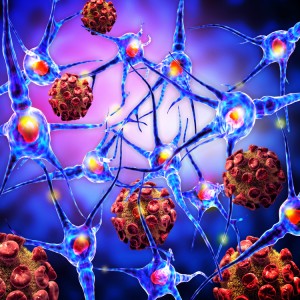 Melanoma that has metastasized to the brain may be more effectively treated using radiation therapy in combination with the drug riluzole than with radiation alone. Researchers at Rutgers Cancer Institute of New Jersey and the Ernest Mario School of Pharmacy at Rutgers University treated mice induced with metastatic melanoma-derived brain cancer with this therapeutic strategy and decreased tumor size over a 37 day period.
Melanoma that has metastasized to the brain may be more effectively treated using radiation therapy in combination with the drug riluzole than with radiation alone. Researchers at Rutgers Cancer Institute of New Jersey and the Ernest Mario School of Pharmacy at Rutgers University treated mice induced with metastatic melanoma-derived brain cancer with this therapeutic strategy and decreased tumor size over a 37 day period.
This new work, “Riluzole Is a Radio-Sensitizing Agent in an In Vivo Model of Brain Metastasis Derived from GRM1 Expressing Human Melanoma Cells,” was published in the journal Pigment Cell & Melanoma Research. In the study, principal investigator Suzie Chen, PhD, of the Ernest Mario School of Pharmacy, and colleagues gave a new application to the drug riluzole (Rilutek), an FDA-approved drug to treat Lough Gehrig’s disease, or amyotrophic lateral sclerosis (ALS), which is a progressive neurodegenerative disease affecting the brain and spinal cord.
Riluzole blocks glutamate signaling, which is implicated in sending messages from neuron to neuron. The protein involved in this signaling process that is acted on by riluzole is metabotropic glutamate receptor 1 (GRM1), a protein that is sufficient to initiate spontaneous melanoma development. According to the team’s article, “We used orthotopic implanted CRM1 expressing human melanoma cell xenografts in mice to demonstrate that animals receiving concurrent [riluzole] and radiation [have decreased] intracranial tumor growth.”
“What this indicates is that riluzole sensitizes GRM1, helping these proteins act like a beacon for radiation so that only melanoma cells with the GRM1 protein will be targeted, sparing the rest of the brain and preserving the brain’s functionality,” stated Dr. Chen in a news release from Rutgers Cancer Institute.
This is no small result, as large doses of radiation are often required to treat melanoma due to radiation therapy resistance. Large doses can lead to neurotoxicity when the radiation is applied to the whole brain. “With approximately 50 percent of patients with melanoma developing brain metastasis and fewer than 13 percent of those patients surviving one year or more, identifying new therapies for this population is paramount,” said James S. Goydox, MD, at Rutgers Cancer Institute.
In addition to metastatic melanoma, other cancers may be combated using Dr. Chen’s approach to concurrent drug and radiation therapy. “Because the GRM1 protein is also found in breast and prostate cancers, pre-treament with riluzole before radiation for these particular cancer might also result in the same outcomes,” said Dr. Goydos.
Treatment in this particular case consisted of daily riluzole with weekly radiation doses of 4 Gy. The group of mice receiving this treatment was compared to no treatment, a radiation dose of 4 Gy alone, or a daily treatment with riluzole alone. By far, the combination approach performed superior, indicating a potential new treatment option for patients with melanoma that has metastasized to the brain.



